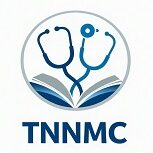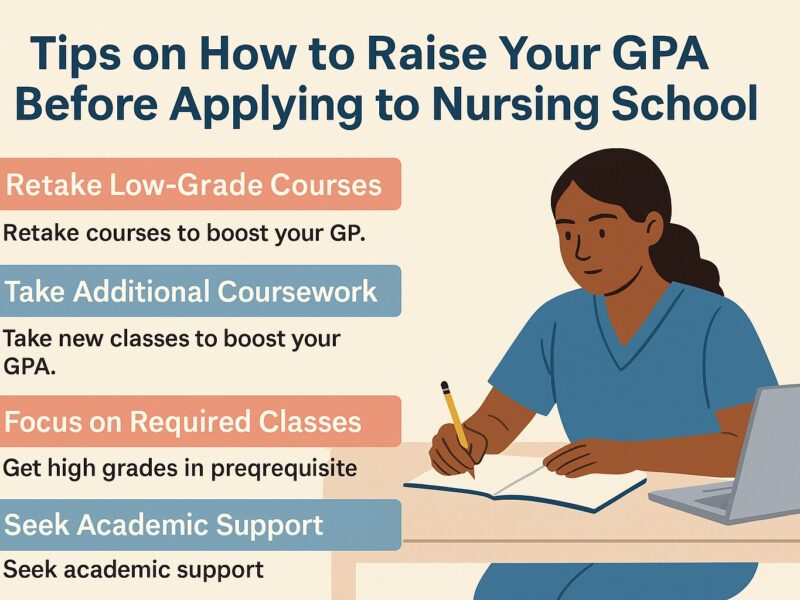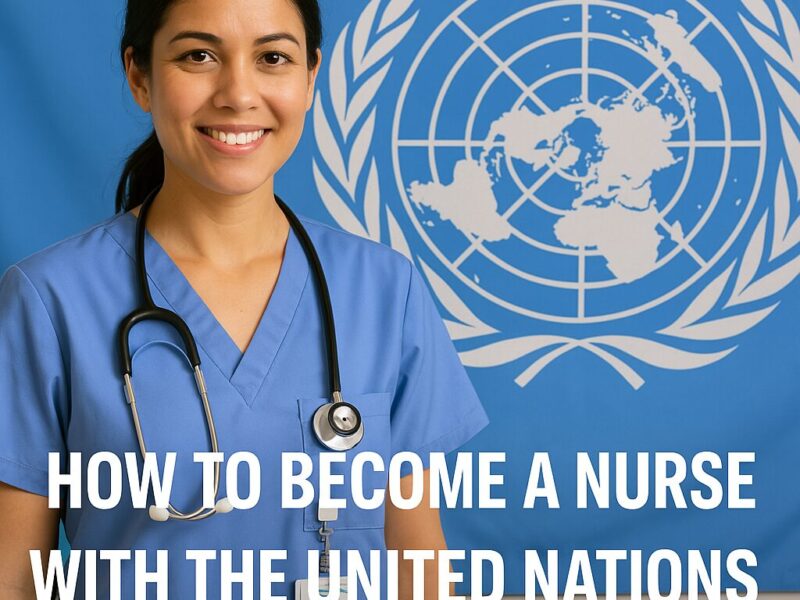The Top ABSN Programs of 2025: Your Guide to Accelerated Nursing Education
There is a pressing and increasing need for qualified nurses within the U.S. healthcare landscape. Forecasts from research companies and government agencies uniformly indicate that the United States faces a significant shortage of registered nurses in the following years due to an ageing population, increased complexity of medical care, and a retiring nursing workforce. This reality reinforces the need for innovative and practical pathways to prepare new nurses to serve the nation’s healthcare needs.
ABSN programmes, in particular, have emerged as a valuable solution among these pathways. These programmes target candidates with a degree in a non-nursing discipline. They provide an accelerated curriculum, allowing them to fast-track their BSN and enter the nursing field versus traditional four-year BSN programmes.
ABSN programmes are helping to tackle the nursing shortage by pulling bright, educated people from other walks of academic life into nursing. It also helps to increase diversity in the nursing profession, as these professionals from different professional backgrounds bring diverse perspectives and skills to the nursing field. Additionally, more healthcare employers expect nurses to hold a Bachelor of Science in Nursing, as BSN degrees strengthen nurses’ education and skill sets.
Accelerated bachelor of science in nursing (ABSN) programmes are designed to satisfy this need, offering a quick yet comprehensive nursing education to individuals who have already completed their undergraduate education in other disciplines. This article details everything you need to know to navigate ABSN programmes across the United States as of 2025.
It will cover how to find top programmes; what to look for when comparing programmes; in-depth spotlights on several leading schools; career opportunities for ABSN graduates; the importance of programme accreditation; current trends influencing accelerated nursing education; a comparison between ABSN and traditional BSN paths; and critical support services for ABSN students. This knowledge is meant to equip all potential students, current healthcare professionals, and policymakers with a complete grasp of the importance of ABSN education and its vital role in the future of healthcare.
II. Finding the Best ABSN Programs for 2025
If you’ve been exploring ABSN programmes, distinguishing the most prominent ones should be your first step. Programme rankings can be a helpful first step in this process. Several good sources rank and evaluate ABSN programs, including U.S. News & World Report, research.com, nurse.org, and allnurses.com. These rankings can give you some idea of the quality of these programmes, but keep in mind that these ranking organisations use different methodologies.
Depending on the method, there can be many considerations, and the weighting of all these factors can vary widely. For example, some rankings emphasise NCLEX (National Council Licensure Examination) pass rates (the percentage of graduates passing the examination to get licensed), reflecting a programme’s overall effectiveness in preparing students for licensure. In contrast, others prioritise factors like graduation rates, faculty credentials, resource availability, or the program’s overall academic reputation. As a result, potential students should seek out rankings from various sources and critically look at the basis for each to tailor their search to their concerns and values.
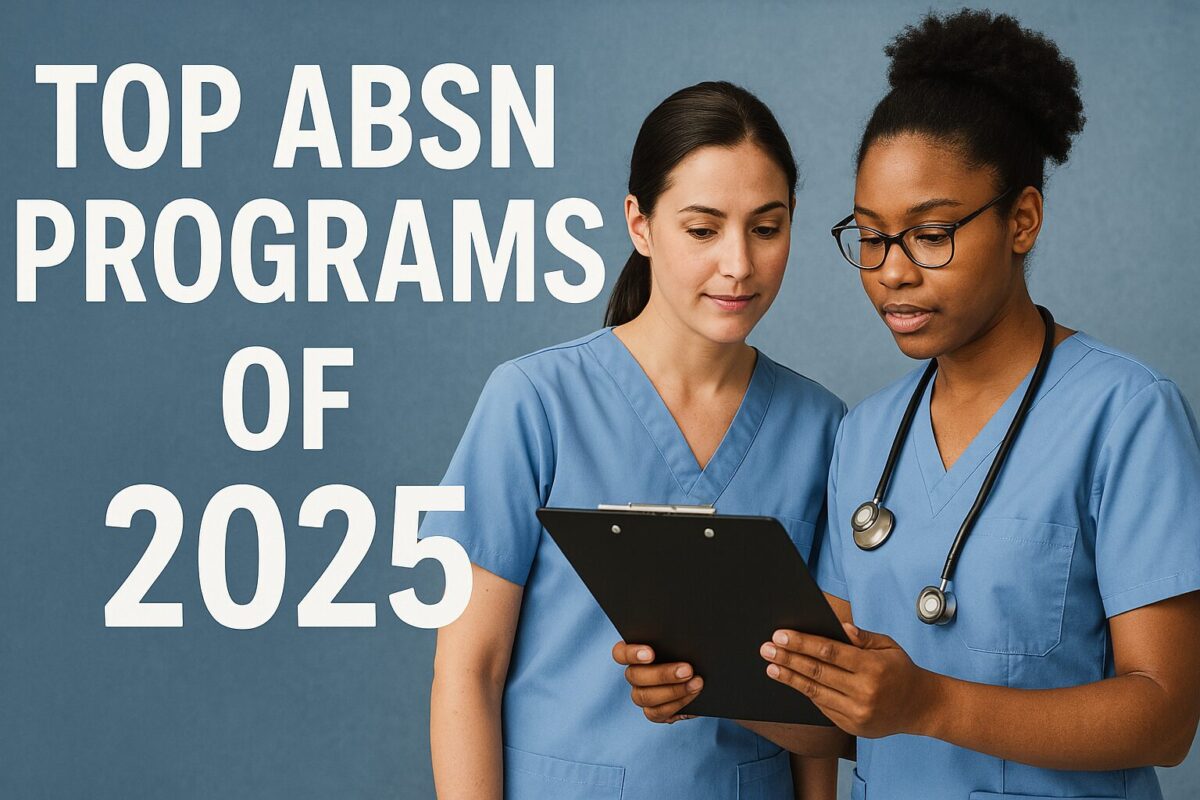
Several key factors are involved in a programme’s high ranking consistently over time. Those programmes with good statistics with NCLEX pass and graduation rates are generally well respected. These include a ranking, which is measured by a positive reputation among academics, healthcare professionals, and the nursing community. Programs that provide substantial and diverse clinical placement opportunities for gaining practical experience in diverse healthcare settings are also highly ranked. The degree and expertise of the faculty, such as their educational tasks, research involvement, and clinical practice, are also essential factors that contribute to a programme’s reputation.
A quick perusal of multiple ranking sources reveals that some ABSN programmes consistently rank in the upper tiers. They include Duke University, the University of Pennsylvania, the University of Washington, Emory University and New York University. The same institutions make it to top spots across lists, regardless of methodology or ranking agency, which indicates a consistent and unwavering dedication to excellence in accelerated nursing education.
This list can be a helpful starting point for those just starting their journey to finding the perfect ABSN programme for them. But we must remember that rankings are not the only things to consider as you make one of the most important decisions of your life. Personal circumstances, targeted professional aspirations, desired modalities for study (online versus on-campus), geographic preferences, and financial implications are all critical factors to consider, along with programme rankings, in making the most informed choice.
III. What to Look For in a Quality ABSN Program Key Evaluation Criteria
Looking beyond programme rankings, a comprehensive review of specific factors is critical to finding the ABSN programme that meets your needs and goals. Critical academic, structural, and supportive dimensions ensure the quality of an accelerated nursing programme.
Academic Performance: The academic performance of an ABSN program can often be evaluated by the quality of its NCLEX pass rates and graduation rates. The NCLEX is the standardised test that all graduates must pass to gain licensure to practice as registered nurses, so the programme’s pass rate directly measures its capacity to prepare students for professional practice.
Consistently high NCLEX pass rates, ideally above the national average, indicate robustness in the curriculum and teaching methodologies. For instance, Duke University’s ABSN programme has an average NCLEX pass rate of 95% over the last three years, and 98% of their ABSN students passed the exam on their first attempt in the previous 10 years.
Across the same lines, the University of Pennsylvania NCLEX-RN 2022-2023 pass rate was also a high 96%. Graduation rates are also critical, as high graduation rates can point to their general satisfaction with the programme, quality of services available to students, and curriculum, which allow for on-time completion. For example, the University of Rochester’s accelerated programme for non-nurses has a two-year graduation rate of over 80 per cent.
Curriculum Rigour and Structure:
The ABSN curriculum should be rigorous and well-structured so students can receive a complete nursing education in an accelerated format. These studies should give you a solid base in core medicinal principles, such as nursing theory, pathophysiology (how illness affects the body), pharmacology (medications), and health assessment. It should also include specialised areas of nursing practice, including medical–surgical nursing, paediatric nursing (caring for children), obstetrics (care during pregnancy and childbirth), and psychiatric-mental health nursing. A key factor for a quality ABSN programme is how well the programme weaves together classroom material into the learning of real-world skills.
This is usually accomplished by practical training in simulation labs, allowing students to enhance vital nursing skills in a safe and controlled environment before they actually deal with patients. Supervised clinical training in a variety of healthcare settings (e.g., hospitals, clinics, community health centres) in order to give students real-life experience and help them become accustomed to the complexities of patient care is also of utmost importance. The University of Washington, for example, has an ABSN programme and claims that its curriculum includes more than 1,000 hours of hands-on patient care via partnerships with over 700 community sites.
Faculty Credentials and Clinical Experience: The credibility of the faculty is the most important factor in a successful ABSN programme. Exemplary faculty are advanced degree holders in nursing, are current in practice or research in the area of nurse education, and prioritise teaching and mentorship. Faculty members with extensive in-practice clinical experience offer a valuable real-world perspective that significantly enhances the classroom experience, assisting students in bridging the gap between theory and practical application in nursing.
Clinical instructors are responsible for student learning during clinical rotations, so they should be experienced nurses able to provide effective guidance and feedback as well as mentorship in the clinical environment. Many programmes will additionally encompass faculty engagement in nursing analysis, which may introduce students to the latest developments in the bottom. Another consideration is student-to-faculty ratio, with a lower ratio often allowing for more personalised attention and support.
Admission Requirements and Length of Programme: Prospective students should be well aware of the admission requirements for ABSN programmes. Most require a completed bachelor’s degree in any subject from an accredited institution. Most programmes also have a minimum GPA for undergraduate work. Prerequisite coursework in the sciences is usually required, too, such as courses in human anatomy and physiology, microbiology and general chemistry. Because ABSN programmes are deliberately fast-paced, the duration of the programmes is a major concern for many students. The average duration for most ABSN programmes is 12 to 16 months. The condensed timeframe necessitates a greater time commitment and a greater dedication level on the part of students.
Tuition Costs and Financial Aid Opportunities: ABSN programmes can vary widely in their associated costs due to the fact that they are offered by all types of schools and various locations and whether the programme is public or private. Potential students must thoroughly investigate total program costs, including tuition, fees, and additional costs. It is also important to investigate the financial aid available to students, including scholarships for second-degree nursing students, grants, and federal or private loan programmes. • Scholarships and Grants: Some universities provide scholarships or grants that are specific to students participating in their ABSN programme.
Accreditation and Recognition: (Nursing education that has been accredited by nationally recognised accrediting bodies, such as the Commission on Collegiate Nursing Education (CCNE) or the Accreditation Commission for Education in Nursing (ACEN), provides a key measure of quality and ensures that the programme meets established standards for its curriculum, faculty, resources, and student outcomes. Accreditation is a common requirement for NCLEX examination eligibility and, subsequently, future employment. Therefore, prospective students can be sure that any ABSN degree they are considering is accredited by either CCNE or ACEN.
IV. Examining Top ABSN Programs
Many ABSN programmes rank high nationally and serve students through various curricula and clinical experiences and programme features. Prospective students may glean some valuable lessons by closely examining several of these leading institutions.
Duke University:
The Accelerated Bachelor of Science in Nursing (ABSN) degree programme at Duke University is a full-time, campus-based programme that will take you just 16 months to complete. The core of the curriculum is centred on wellness, health promotion, disease prevention, clinical leadership, evidence-based nursing practice, and culturally competent care. This programme comprises 15 ABSN particular courses, 2 elective courses and greater than 750 hours of scientific clinical experiences.
The ABSN programme at Duke has some unique features, such as the chance to earn six credits toward a master’s degree programme in the same school. Health Assessment & Promotion, Nursing Care of the Childbearing Family, and Nursing Management of the Adult Patient with Health Problems, to mention a few. Students have access to high-fidelity simulation labs and clinical placements in local and broader contexts.
University of Pennsylvania:
The University of Pennsylvania BSN Second Degree Program is an accelerated programme in Philadelphia for people who already have a bachelor’s degree. The programme focuses on the hands-on experience of dynamic learning situations, innovative simulations, holistic mentoring, hands-on clinical practices and community learning options.
What sets this programme apart is that eligible students will be able to start taking graduate-level courses at Penn while completing their BSN through a submatriculation programme. Courses integrate prerequisite coursework in sciences and general education with nursing-specific coursework, covering Nursing Foundations, Health Assessment, Pharmacology, Medical-Surgical Nursing, Paediatric Health Nursing, Mental Health Nursing, Population Health, Maternal-Infant Nursing, and Nursing Leadership.
University of Washington:
Located in Seattle, the University of Washington’s Accelerated Bachelor of Science in Nursing (ABSN) programme is a distinctive four-quarter, full-time programme. This demanding 79 credit-hour curriculum is delivered by highly regarded faculty, including national authorities, and includes a balance of theoretical frameworks and practical clinical experiences.
Students learn nursing theory in the classroom and practice clinical skills in the school’s “Learning Lab” before providing hands-on patient care — upwards of 1,000 hours — at one of its community partnership sites, including University of Washington Medical Centre and Seattle Children’s Hospital.
Core courses include foundation courses; community and population health; specialised areas of nursing (such as psychosocial nursing and care of adults and sick populations, nursing for children and childbearing families, and healthcare systems and policy); and a transition to clinical practice practicum. Possibly of interest is the ABSN track with early admission possibility to the DNP-NM (Doctor of Nursing Practice Nurse-Midwifery) programme.
Emory University:
Emory University’s Nell Hodgson Woodruff School of Nursing offers a Distance Accelerated Bachelor of Science in Nursing (DABSN) programme for those who live outside the Atlanta metro region. With small class sizes, this programme provides individual attention and can be completed in just 15 months. The programme is a mix of online coursework as well as clinical training and simulation lab experience.
One should have learnt professional nursing practice; foundations of nursing science; health assessment; pathophysiology and pharmacology; nursing in acute and chronic care; maternity and reproductive health nursing; nursing for paediatrics; community health; working with vulnerable populations; nursing in complex situations and nursing leadership. The programme requires students to complete over 660 clinical hours. There are three cohorts each year (January, June, and September).
New York University:
If you hold a bachelor’s degree in another subject and meet certain prerequisite academic requirements, you can enter New York University’s Rory Meyers College of Nursing 15-month Accelerated Bachelor of Science in Nursing (BSN) programme. This rigorous, full-time curriculum is completed in four consecutive semesters of full-time study, and you can begin in either the fall or spring semester. The curriculum includes 64 nursing credits and prepares students for the NCLEX-RN exam.
The programme is predominantly in-class with clinical experiences in various practice settings. Some of the courses that make up the curriculum are Health Assessment & Promotion, Pathophysiology, Adult & Elder Nursing, Professional Nursing, Integrating Evidence into Clinical Practice, Psychiatric Mental Health Nursing, Maternity Nursing, Paediatric Nursing, Community Health Nursing and Leadership & Management in Nursing. NYU offers a BS/MS dual-degree programme and a double major in Nursing and Global Public Health as well.
Transitioning from the Classroom to the Workplace: Career Paths & Outcomes for ABSN Graduates
ABSN programme graduates are prepared to enter the field of nursing in multiple entry-level roles. Common types of registered nurses include adult medical-surgical nurses, who provide care for adult patients with various medical conditions; critical care nurses, who care for patients in intensive care units; emergency room nurses, who care for patients with acute and life-threatening conditions; paediatric nurses, who specialise in the care of children; and many speciality areas.
Graduates from universities that offer this type of nursing programme, called Accelerated Bachelor of Science in Nursing (ABSN), tend to have high employment rates due to the strong demand for registered nurses. “The Job Placement Percentage is the number of students who find work at least part-time within a few months after graduating from the programme.” For example, according to Emory University, 97% of pre-licensure nursing graduates report being employed within three months after graduation, while Heritage University reports a 100% employment rate for nursing students within one year of graduation.
Factors such as geographic location, the type of healthcare setting and the speciality chosen by the nurse can greatly affect the average starting salaries for ABSN graduates. That being said, some reports indicate that starting salaries for BSN-prepared nurses are competitive. To put this in perspective, the starting salary for Emory University’s pre-licensure graduates is $68,000, while New York University reports that their nursing graduates have an average starting salary of over $95,000. The U.S. Bureau of Labour Statistics forecasts that employment of registered nurses will grow 6% from 2022 to 2032, showing ongoing robust demand for professionals in this arena.
An ABSN degree also provides an excellent foundation for advanced nursing education and specialisation. Many graduates of ABSN programmes pursue postgraduate clinical practice programmes and earn a Master of Science in Nursing (MSN) or a Doctor of Nursing Practice (DNP) degree as a way to get into advanced practice roles, such as nurse practitioner, clinical nurse specialist, nurse anaesthetist or nurse-midwife.
Additional Benefits of ABSN Programs Some ABSN programs have articulation agreements with graduate programs, providing a pathway for a seamless transition for students who want to continue their education. For example, ABSN students can earn credits that apply toward a master’s or doctoral degree at both Duke University and the University of Washington.
VI. Ensuring Quality: Why Accreditation Matters in ABSN Programs
Accreditation is the process through which an authoritative body evaluates and recognises the quality and integrity of nursing education programmes, including Accelerated Bachelor of Science in Nursing (ABSN) programmes. The two major accrediting organisations in the United States are the Commission on Collegiate Nursing Education (CCNE) and the Accreditation Commission for Education in Nursing (ACEN). The CCNE is an independent accrediting agency recognised by the U.S.
Department of Education that promotes the quality and integrity of baccalaureate, graduate, and residency programmes in nursing. Its mission is to be of benefit to the public by evaluating and recognising programmes that practise effective educational practices. For example, the Accreditation Commission for Education in Nursing (ACEN) offered accreditation for nursing education programmes (associate, diploma, baccalaureate, master’s, and doctoral degrees) with an emphasis on quality and continuous improvement. These organisations set high standards, which accredited programmes must meet across their curriculum, faculty qualifications, resources, and student outcomes.
The consistently top-ranked ABSN programmes overviewed in this guide—Duke University, the University of Pennsylvania, the University of Washington, Emory University, and New York University—have either CCNE or ACEN accreditation. This ensures that these programmes have passed an extensive evaluation process and are dedicated to delivering nursing education of high quality, aligned with recognised national standards.
Continue finding an accredited ABSN programme that is perfect for you! You can usually find this information on the programme’s official website or through the websites of the CCNE and the ACEN. Adopting an accredited programme is crucial since it guarantees a specific standard of academic excellence, as well as being mandatory in determining eligibility for licensure and for continuing your educational studies or expanding your career later on.
VII. Trends in ABSN Education and Challenges of the Accelerated Path
Accelerated nursing education is constantly evolving, and there are several trends and innovations that are influencing how ABSN programmes are implemented and the skill sets that graduates possess. A primary trend is the incorporation of more technology into ABSN curricula. It is now common for many programmes to utilise online learning platforms to provide didactic coursework, allowing students greater flexibility and accessibility.
Hybrid models that combine online learning with in-person components like skills labs and clinical rotations are also gaining popularity. ABSN programmes are also able to use more advanced simulation technologies. Tools such as high-fidelity simulators and virtual reality give learners realistic, hands-on opportunities to practise critical nursing skills and decision-making without risk to real patients.
Incorporating technology into the nursing curriculum is vital for adapting the education system to meet contemporary needs and ensuring that graduates are equipped with the skills and knowledge to effectively utilise technology in their future nursing practice.
Though ABSN programmes are not new, they are still an important part of tackling the ever-present U.S. nursing shortage. These programmes quickly boost the pool of BSN-prepared nurses by offering an expedited entry into the profession to those who already hold a bachelor’s degree (Lundquist, 2020). Furthermore, an ABSN programme can recruit a more diverse group of students, bringing people with different majors and professional experience into the nursing field; in the long term, this may help create a more diverse nursing workforce that can serve a varied patient population.
In order to accommodate the changes in healthcare, ABSN programmes are also updating their curricula to ensure graduates are ready to tackle the future. These include an increased focus on interprofessional collaboration (nurses working well with other healthcare providers as part of a team), increased emphasis on population health (understanding the health needs of entire communities), integrating evidence-based practice (making clinical decisions based on the best available research), and developing culturally competent care skills (delivering sensitive and effective care to patients from a variety of backgrounds). These curriculum updates are what set ABSN gr July 9, 2023 - HCP _ significantly apart, preparing new nurses equipped with the ever-changing landscape of health care complexities and challenges.
VIII. [ABSN Vs. Traditional BSN]
If you are thinking about attending nursing school, you have probably been faced with the decision of whether to pursue an Accelerated BSN (ABSN) programme or a traditional four-year Bachelor of Science in Nursing (BSN) programme. It is important to know the main differences between these pathways in order to make an informed decision that aligns with one’s situational and career goals.
Difference in Programme Length, Duration & Cost: The biggest difference is the duration of the programmes. Traditional BSN programmes often span four years of full-time study, while ABSN programmes are much shorter, typically taking 12–16 months to complete.
The fast process of ABSN programmes is possible due to the singular focus on nursing coursework since students entering these programmes have already earned a bachelor’s degree and have covered their general education coursework. Traditional BSN programs, on the other hand, provide a more well-rounded curriculum that involves general education requirements as well as nursing-specific material. For admission requirements, ABSN programmes require a previous bachelor’s degree, while traditional BSN programmes typically require at least a high school diploma or some previous college credit.
The speed and nature of learning also vary widely. ABSN programmes are significantly faster and more demanding; students need to learn a lot of information in a short period of time. In terms of cost, ABSN programs’ per-credit tuition may be higher in some circumstances; however, due to the much-shortened timeframe between start and graduation, the overall program cost can be similar or even less than a traditional BSN. Mom and Dad, there is also an increased likelihood of family support and understanding if you pursue a traditional BSN program, as they do have the options for part-time study that are not possible with the study intensity of most ABSN programs.
Pros and Cons: When choosing between an ABSN and traditional BSN programme, the decision is highly dependent on the individual learner. ABSNs provide a fast track into a nursing career for those who want a career change or are highly driven to enter the field as soon as possible.
The concentrated curriculum supports an in-depth understanding of nursing-specific knowledge and skills. Although the more intensive speed and volume require a considerable time commitment, so working while enrolled may be difficult. On the flipside, traditional BSN programmes may be better suited for newer college students and those who appreciate a slower-paced journey. A longer term also affords more flexibility in work, etc. Ultimately, the right choice will depend on an individual’s background in education, career goals, learning style, finances and life situation.
IX. Supporting Success: Resources and Services at Leading ABSN Programs
Understanding the rigorous nature of accelerated nursing education, leading ABSN programmes furnish holistic support services so you can thrive in your studies and nursing career.
Academic Advising and Career Counselling:
ABSN students receive comprehensive academic advising essential to navigating the intensity of the curriculum, understanding programme requirements, and selecting from any available elective courses.
Dedicated academic advisors support learners throughout their programmes. You also have career counselling services on offer to help you with your career development. These services may encompass resume writing and cover writing workshops, interview skills training, job search strategies, and networking opportunities to support students’ transition into their post-graduation careers.
Tutoring, Mentorship, and Peer Support Networks:
Various ABSN packages provide peer- and faculty-led tutoring offerings for college students struggling with tough coursework. One of the most impactful resources for nursing students is mentorship programmes that connect students with experienced nurses, faculty, or alumni from the programme. In addition, cultivating peer support networks among students in the programme can also foster community and allow students to learn from the experiences and challenges of their peers.
Partnerships for the clinical placements and the experiential learning:
It necessitates strong partnerships with several types of healthcare institutions to help provide the ABSN students with a variety of quality clinical experiences. These collaborations enable students to gain practical, hands-on experience in a variety of healthcare settings, including hospitals, clinics, and community health organisations, and to work with different types of patients. Some top programmes may also have unique experiential learning opportunities to offer, which could range from global health immersion trips to specialised simulation programmes that go beyond basic skills training to faculty-led research projects that students can participate in. Such experiences can be vital to a student’s learning and preparation for a career in nursing.
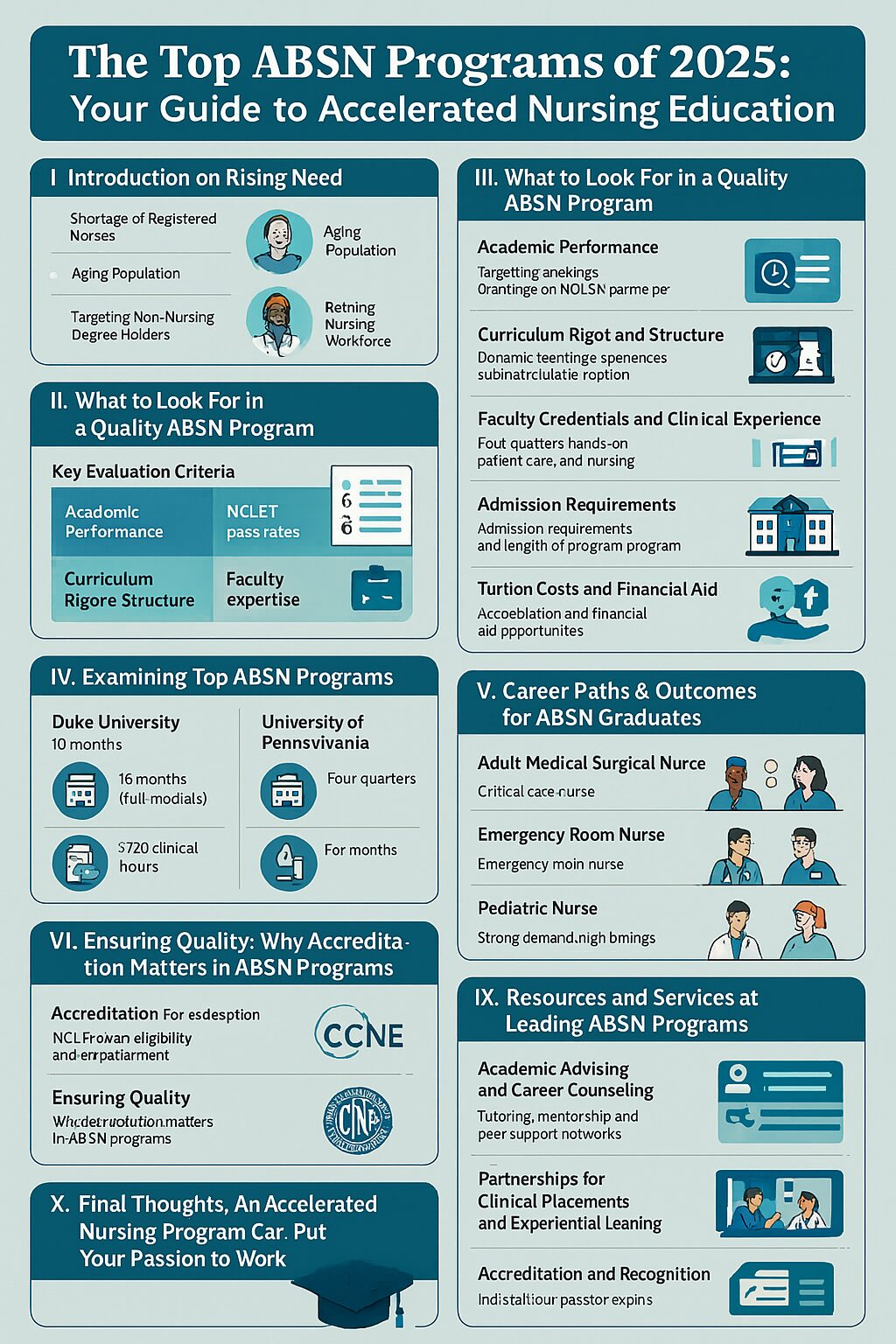
X. Final Thoughts: An Accelerated Nursing Program Can Put Your Passion to Work
Deciding on an ABSN programme is a big decision that will affect the rest of your nursing career. As this guide has made clear, there are a number of important factors to keep in mind. This is why, although programme rankings from reliable sources can give you a good basis for comparison, you have to evaluate them from a critical point of view and understand the methodologies that led to them.
Program accreditation by the CCNE or ACEN is an essential requirement to guarantee the program’s quality and facilitate licensure. High NCLEX pass rates and graduation rates are markers for strong programmes. A strong curriculum combined with an abundance of clinical experience opportunities and access to experienced, able instructors are the cornerstones of a quality ABSN education.
In addition to researching a programme’s deadlines and how to apply, prospective students should also take careful stock of the programme’s admissions requirements, programme length, and total cost, as well as how much financial aid is available. Lastly, the resources you have available with the programme support services, like academic advising, career support, tutoring, mentorship, and clinical placements, could really help you succeed in the rigorous ABSN environment.
We advise all potential students to research thoroughly based on their unique requirements, career goals, learning styles, financial capability, etc. To learn more about their specific offerings, visit the homepages of the highlighted universities—Duke University, the University of Pennsylvania, the University of Washington, Emory University, and New York University—or other known ABSN programmes.
An ABSN programme is a rigorous and rewarding entrance path from a previous bachelor’s field of study into the rewarding and meaningful profession of nursing. You will dedicate so much to your accelerated nursing education, but the effort will be worth it when you find yourself with a career in which you can make a meaningful difference in the lives of individuals, families, and communities. The nursing profession opens a plethora of opportunities, and an ABSN programme is the first step towards advancing your career as a health professional.
